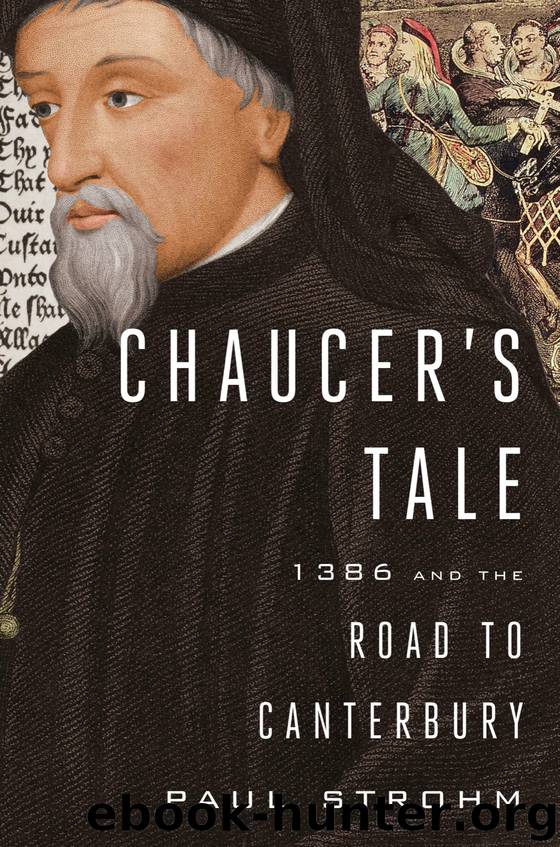Chaucer's Tale by Paul Strohm

Author:Paul Strohm
Language: eng
Format: epub, mobi
Publisher: Penguin Group US
Published: 2014-10-22T16:00:00+00:00
CHAPTER FIVE
The Other Chaucer
One can immerse oneself in the extensive Life-Records without learning that Chaucer was a writer at all. This does not mean that he wasn’t writing, but only that his writing occurred beneath, or at least outside, the attention of the record keepers. Records were kept for many reasons, involving governmental and bureaucratic receipts and expenditures, appointments and rewards, but completion and circulation of poems would not normally have attracted their notice. Chaucer could have been quietly building a literary reputation without any disturbance of the written record at all. But a good deal of emphasis must fall on the word “quietly.” Even in midcareer he would have been better known to most Londoners as a practical functionary—a man with suspiciously good court connections and a compliant partner of Nicholas Brembre and other city connivers—than for his literary accomplishments. In the pivotal year 1386, at the mature age of forty-two or forty-three, Chaucer was a man of literary accomplishment, standing on the brink of his decision to write the Canterbury Tales. Yet his recognition as a writer was confined to a small circle of intimates, without extending to Londoners at large.
Chaucer the writer was, in effect, an “other” Chaucer, shielded from public view and pursuing his craft less as a public performance than as a private avocation. This Chaucer wrote as a matter of personal choice and not for acclaim or reward. Well into midlife, he treated his poetry as essentially a private matter to be shared with like-minded friends in intimate circumstances rather than as an engine of personal fame. Temperamentally, he disdained self-promotion, regarding Tuscan eminences like Dante and Petrarch as particularly egregious offenders. Nothing interested him less than the idea of broadcasting his writing to an absent and anonymous clientele.
Chaucer’s withdrawal to Kent at the end of 1386 gave him time, if nothing else, to think about his literary career. The 1380s were a crucial decade for literary change in England, and Chaucer’s literary situation was as volatile as everything else in his world. New ideas about writing, authorship, audience, circulation, and personal renown were in the air. Writing in English—an unusual decision when Chaucer made it in the 1360s—was taking hold, and demand for works in the native language beginning to grow. Technologies of literary circulation were in rapid development, encouraging the copying and circulation of manuscripts to larger and farther-flung audiences. Chaucer’s literary contemporaries were beginning to think differently about claiming credit for their work. Taken together, these developments began to suggest new ways of being a writer, new stagings of a literary career. His just-completed Troilus registers the first signs of a shift; that poem’s conclusion expresses a welter of confused and disturbing new literary ambitions and desires.
Before turning to the departures of 1386, though, some attention is owed to his earlier accomplishments, to the substantial literary labors that had brought him to this point of change.
The Poet in 1386
Chaucer had been writing steadily throughout his adult life. By 1386 he had
Download
This site does not store any files on its server. We only index and link to content provided by other sites. Please contact the content providers to delete copyright contents if any and email us, we'll remove relevant links or contents immediately.
| Ancient & Classical | Arthurian Romance |
| Beat Generation | Feminist |
| Gothic & Romantic | LGBT |
| Medieval | Modern |
| Modernism | Postmodernism |
| Renaissance | Shakespeare |
| Surrealism | Victorian |
4 3 2 1: A Novel by Paul Auster(12392)
The handmaid's tale by Margaret Atwood(7763)
Giovanni's Room by James Baldwin(7346)
Asking the Right Questions: A Guide to Critical Thinking by M. Neil Browne & Stuart M. Keeley(5775)
Big Magic: Creative Living Beyond Fear by Elizabeth Gilbert(5771)
Ego Is the Enemy by Ryan Holiday(5450)
The Body: A Guide for Occupants by Bill Bryson(5096)
On Writing A Memoir of the Craft by Stephen King(4944)
Ken Follett - World without end by Ken Follett(4732)
Adulting by Kelly Williams Brown(4574)
Bluets by Maggie Nelson(4556)
Eat That Frog! by Brian Tracy(4540)
Guilty Pleasures by Laurell K Hamilton(4449)
The Poetry of Pablo Neruda by Pablo Neruda(4109)
Alive: The Story of the Andes Survivors by Piers Paul Read(4033)
White Noise - A Novel by Don DeLillo(4010)
Fingerprints of the Gods by Graham Hancock(4004)
The Book of Joy by Dalai Lama(3986)
The Bookshop by Penelope Fitzgerald(3853)
